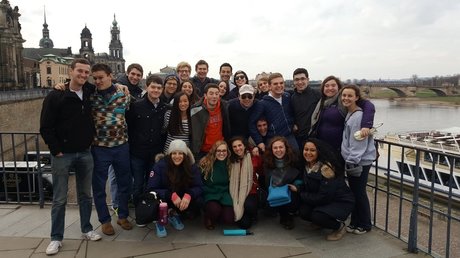 Unlike many of my peers on our Alternative Spring Break trip to Berlin, I didn’t have many personal connections to Germany or even the Holocaust. All of my grandparents were born and raised safely in the United States by the time World War II came, so thinking about the Holocaust has always been one-step removed. I have also been fortunate enough to spend time on other trips diving deeper into Holocaust education and remembrance, including a week in Poland touring Auschwitz and the other infamous death camps. Because of all of this, my experience in Berlin was perhaps different than someone who lost a relative during the Holocaust or who had never previously come into physical contact with relics of the atrocity that occurred. Maybe I thought I would feel more distant from the history, but leaving Germany, I could not have felt more differently. If you glimpse at the past hundred years of German history, you’re immediately forced to grapple with stark changes in national identity. After WWI, Germany was meeting modernity, yet unsure of what it meant to be German. During WWII, Germany had a narrow definition of its national identity and sought to persecute all who did not fit within it. After WWII, Germany was split and forced into two vastly different schools of politics and thought. And finally, after reunification, about 5 years before I was born, Germany was given a bunch of broken pieces and a goal for a modern Western democracy. Coming into contact with all of these points of identity change forced me to think about how volatile identity is in the world we live in. As humans, we seek continuity, especially in our identities, so I empathized with how Germans and especially German Jews were forced to continually readdress their own identities as the history of the world marched forward. Just as German identity has continued to shift over time, I have realized that Jewish identity, too, must continually be reflected upon and not merely something taken for granted. Identity isn’t static, it responds to the experiences around us and transforms as we process the people, places, and things with which we come into contact. Although I didn’t expect it, I think I was one of many students whose understanding of my Jewish identity evolved over the course of my time in Berlin. Throughout my life, I have come into contact with various Jewish communities, studied and socialized in different schools, and have participated as a citizen in many different political climates. With each change, I am forced to recapitulate what being Jewish means in the here and now that I experience. For one German Jew, every decade, every year brought new challenges and opportunities for understanding national and religious identity. While in Germany, I was forced to reflect upon my role as a citizen, as a member of a faith community, and as someone who has one foot in each community: the secular and the religious. I was reminded of all of the Jewish people who, over the past hundred years, have sustained themselves through the tumultuous history of the world and have adapted to make sense of it all. So perhaps I did not arrive to Germany with an immediate connection to the narrative shared with us, but it did not take long for me to understand the volatile history of identity transformation in the country and how I was far from immune from that process of transformation, as well. -- Michaela Brown Class of 2017 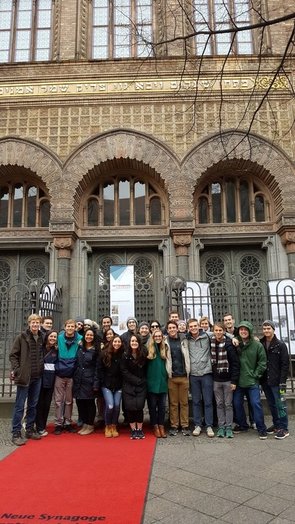 The hustle and bustle of school has made me focus a lot more on things other than Germany for the last two weeks. But every time I pass someone who was on the trip, or see the slice of the Berlin Wall on Grounds, someone mentions Germany in my Cold War history class, or I glance at the journal that Germany Close Up gave me, I am jarred back into that experience. For me, the Germany trip was a rollercoaster ride of education, emotion, fun, and thinking. It was an experience very few are lucky enough to have. Some things that have really stuck out to me, that I keep going back and pondering on, were our visit to the Sachsenhausen concentration camp, meeting with the German member of federal Parliament, and walking around to street markets on that last day of the trip. With Sachsenhausen, I have been thinking a lot about the courtyard in front of tower A where the prisoners would line up for roll call. I think of the frigid winters and the blazing summers, the smaller children and older men; I think of the Russian POWs and the gays there, of the guards who went back to their quarters for a beer or tea after a hard day of work. I think about how there was life in the camp. I think about how people’s existences were confined in those walls and watched in those towers. I haven’t reacted as emotionally as I thought I would to seeing a concentration camp, but the thought lingers in my mind: “What if that were my family and me.” The member of German Federal Parliament left me with a completely different feel. His ability to absorb our tough questions and give direct, graceful answers is something I really admired about how he handled us. Not only that, I think he displayed a lot of prudence and strong values, something a lot of us were keen to hear after our political discussion in Dresden. (For those of y’all who were on the trip, I also can’t get the sound of Gunther’s voice out of my head!). Finally, the last day we were in Berlin, which coincided with Shabbat, was really special to me. Having the time off to walk around the city, explore, go to art exhibits, duck into random stores, do some people watching, eat a bratwurst, and do a lot of the things I wanted to do in Berlin was an absolute highlight of the trip. After spending a week rigorously learning and grappling, it was very cool to settle in and see what “a day in the life” is like. Walking around the city with some of my best friends and just being present in that moment is a memory I’ll keep for the rest of my life. -- Erik Roberts Class of 2018 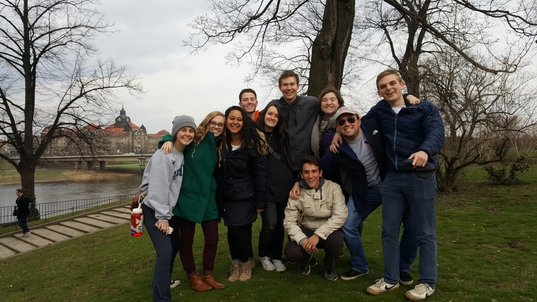 One of the most wonderful aspects of group travel is the variety of lenses through which each member of a group views his or her experience. Each comes in with different interests that they want to address, and leaves with a unique take on what they have seen. I often find myself noticing these themes and trends when others have asked questions or engaged in conversation. More often than not, these themes relate to our personal goals, areas of study, and passions. Our trip was no exception to this. For me, each question I asked and every conversation I started related somehow to education and experiential learning because these are my passions. For others it was religion, history, health, and, of course, politics. It was as though each of us was a delegate from our respective groups, coming together to teach to and learn from one another. The best part was that these interactions gave all of us the chance to learn something new that we may not have had the opportunity to learn otherwise. I specifically recall one day where a Biomedical Engineering student explained to everyone that the reason she was so engaged and asking so many questions was because back at school she would never have such an opportunity to focus so deeply on history and the humanities. This got me thinking about how easy it is for each of us to get wrapped up in a specific realm of learning or work. Of course this isn’t a bad thing. We need the devoted Biomedical Engineering students of the world to stay on course and innovate, and we need the Religious Studies majors to focus on finding common-ground and understanding between groups. However, I was reminded on this trip how valuable it is to be able to take breaks from our tireless pursuits to absorb new ideas and perspectives. When we do this, we are encouraging a world full of well-rounded and empathetic individuals who are capable of working with one another in the name of progress. I feel incredibly lucky to have had the opportunity to learn with my fellow wahoos on this trip! Best, Annie Weinberg Youth and Social Innovation University of Virginia ‘19 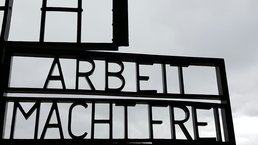 I didn't know what to expect coming on this trip. I thought I didn't have many expectations to begin with, but that doesn't seem to be the case. The experiences I am getting, the conversations I am having, and the things I am learning are challenging me to reflect and reconsider both how I think of my Jewish identity and with today's public policy challenges. On Monday we visited the Sachsenhausen concentration camp. I knew this would be an emotionally tough experience, but I don't think any kind of emotional preparation could have truly prepared me for the experience. Walking through the gates reading "arbeit macht frei" translating to "work sets you free", I got a sickening feeling. It was an empty saying. There was no chance for freedom. We learned that Nazi soldiers would taunt the Jews and prisoners by saying there was one way to freedom then point to the smoke tower of the crematorium. I walked around with a pit in my stomach. The extent of physical planning, consciousness in decision making, and psychological manipulation of the Nazis is something I will never be able to comprehend but started to grapple with walking through the camp. The true feelings of hate and dehumanization of Jews was powerful enough to make human beings do really terrible things to other human beings-- a concept I simply can't wrap my brain around. Throughout the day I saw a number of things that became visions burned into my brain; a barrack where Jews would sleep 3 to a bed in tiny bunks stacked one on top of the other, a field that would be packed with prisoners as they stood in lines for role call waiting in the cold for hours with nothing but thin, stripped uniforms, what was left of the ovens where countless people were murdered... Imagining the scenes of what it looked like when the camp was running and seeing what was left of it there today, these disturbing images were stuck in my mind, and I found myself quickly sketching these bits to try to get them out. As I walked out of the gates and left the concentration camp, I couldn't help but get the strange feeling that if I was here a couple decades prior, I may have never been able to pass through these gates in this direction. I don't think I will ever be able to fully comprehend what this experience was like for my ancestors and the millions of people who were murdered in places like this at the hands of hatred. Though incomparable to 1945, I couldn't help but think about the largely hateful rhetoric surrounding minority groups today. Whether it is with neo-Nazis in Germany, domestic issues we face in the US, or the persecution of other races and religions around the world, we cannot let history repeat itself. As Jews, but more importantly as humans, we have an obligation to stand up for human rights. Over 11 million murdered cannot go unnoticed. It still may take me quite some time to process this experience fully, but now in the time being I'm feeling more committed to standing up for those who can't stand up for themselves. Diane D'Costa 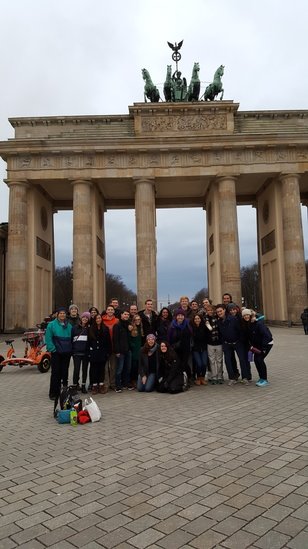 Hello friends and family of my new found friends! Shockingly, it is already Thursday (I would include the time but that’s different for you and me and thus would make it kind of confusing) and so, sadly, we only have a few more days in Deutschland. Our time here to date has been full of delightful, interesting, and meaningful experiences. Let’s recap. We have two guides- Richard and Kaleen. They’re exceptional people and very knowledgeable about everything we see. Perhaps more importantly, they make sure we’re always on time for the next activity. Sometimes this entails scurrying across tram tracks but, most of the time, it doesn’t. Also, Melissa is joining us. She’s good at counting, which is important because sometimes we like to wander and losing a student would be bad. As for our actual activities they have been varied and full. Our first day was named “Space and Time in Berlin”. Unfortunately, we didn’t go to space but we did have a fantastic walking (mostly standing) tour during which we learned about our neighborhood: Jewish Berlin Mitte. We also zoomed through the German Historical Museum AND did a bus tour of the city. It was CRAZY but mostly just really busy. The sights were real, they were cool, and the bus was comfy. Many tried to stay awake for the duration and, though I tried my hardest, I was not among them. We’ve also done a whole lot more and If I listed every activity we’d never leave (and, more importantly, I’ll never get to sleep on this train). So let’s go ludacris speed. We’ve visited the Holocaust Memorial and a Concentration Camp (look for another post on that from my esteemed colleague Diane), spent a day in Dresden exploring the sights, and another day in Dresden talking a bit about the political situation and exploring an old Stasi jail. It has been an absolute whirlwind. Full of great information, new friends (I’m looking at you… everyone), and .5 liter steins of beer. Germany has not failed to impress. Of course, we have also spent much of our time discussing Germany’s past, how Jewish society in Germany has changed and developed, and how we feel and can relate to different events and realities. Oh, and of course I have to mention the food. They are feeding us exceptionally well. Dare I say even: terrifically well. Steak and gnocchi and strudel, oh my! Their pork knuckle even comes with the skin, tendons, and bone. That’s what I call value (and an extremely troublesome psychological barrier)! Anyways, we’re doing great, we’re learning lots, and no one has yet fallen in the river. Go hoos! - Zach Diamond Class of 2017 |
The Brody Jewish Center, Hillel at the University of Virginia, is the focal point in a renaissance of Jewish life for the 1,000 Jewish students on Grounds. Archives
September 2021
Categories
All
|
 RSS Feed
RSS Feed